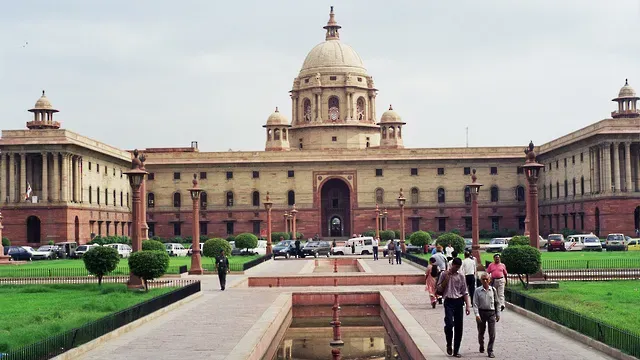Does India have what it takes to become a member of the International Energy Agency?
In conversation with Nicole Thomas, IEA's India Programme Manager

Welcome to this special edition of Lights On, where you find the key stories on energy and climate change in South Asia.
In yesterday’s story about the India’s Energy Outlook 2021 report you heard from Nicole Thomas, IEA’s India Programme Manager. I decided to post the full interview where we discuss a potential IEA membership for India, a prospect that has excited the energy community after the government announced a strategic partnership with the apex energy agency.
If you are reading this interview you are already a Lights On member, but if you wanted to share this newsletter with a friend or two that would also help a lot:

The IEA is headquartered in Paris - Image credit: Pixabay
Lights On: What are the advantages that come with a IEA membership?
Nicole Thomas: The IEA was created back in 1974, in response to the oil crisis at the time, and it was initially focused very much on energy and oil security. We have an oil stock holding mechanism that's used to respond to oil crises and reduce potential economic effects of any oil crisis in the future. Over time, its role has expanded a lot to cover the whole energy sector. So focusing on energy security and sustainability. And I guess there's interest from other countries in being part of that both in terms of ensuring and working towards their energy security, but also in terms of the data and the analysis, and the policy recommendations that the IEA provides to the government members, across those broad issues of energy security and sustainability.
The IEA was born with the goal to ensure countries’ energy security through sufficient resources. How has the concept of energy security evolved over the years?
Back in the 1970s, energy security as a whole was very focused on oil. These days the remit of the IEA is much broader, it incorporates electricity, security, electricity markets. And it's really interesting and challenging to have to manage a market that has to match supply and demand every second of the day, allowing your economy to function and avoid disruptions to electricity.
In terms of gas security, with increasing LNG markets you're seeing a bit more diversity in gas markets rather than just gas pipelines, but countries still have to maintain significant supply at a reasonable price. And then something that we're increasingly focusing on at the moment is the clean energy transition. And that's also part of the definition of energy security, because if we're not moving towards sustainable energy that’s a huge risk for economies. So yes, the definition of energy security has changed hugely over the last 50 years.
In the context of planetary energy security, what does India bring to the table? Could it play a strategic role in the region’s energy politics?
Having India involved is really important both for the IEA and for India, in terms of looking at that security picture, and at the broader role of the IEA encouraging and supporting clean energy transitions.
India is the third largest energy consumer in the world, so to be a truly global energy agency, the IEA needs to have India and other emerging economies in the tent, both in terms of being able to support them through their transitions, encourage them and support their energy security, but also sharing their findings and their experiences. India has done some incredible work in terms of energy access, in terms of a really rapid renewable energy rollout. And those are lessons that it can share internationally as well.
What are the next challenges for India, as energy consumer but also as a country that has to rethink its energy system. We know that there are many systemic issues that need to be addressed, such as the state of distribution companies or interstate relations when it comes to power trade. How do you see this situation evolving?
All of these big policy issues are something that Indian government is going to have to consider. And it's hard to pick just one but I think that through the new India Energy Outlook report something that people will be able to see when they read it is how pivotal India's policy decisions are towards India's energy future. The policy decisions that we make now will have a huge impact over the longer term, and particularly in this current moment with the recovery from Covid. It provides a really big opportunity for India and for countries around the world to frame this build back better. And India's one of the countries that this is most important for, because of the economic growth and all of the infrastructure that will be put in place over the coming years.
Compared to a lot of other countries, so much of the infrastructure that India will be using in 2050 is yet to be built. So it's a real opportunity to focus on sustainability now and be able to address those issues sooner rather than later.
This may be tricky because at the moment we see this dichotomy in India, between investing in coal and try to make it work, while at the same time trying to add lots of renewable capacity.
At the start of last year, we released an in depth review of India’s energy policies. And one of the things we acknowledged is your exact point, that having so many different ministries working on various aspects makes it really hard to have a coordinated Indian energy policy. Increasing coordination between ministries would definitely help make sure all the policies are consistent, and addressing the nexus between energy, air pollution and climate I think would lead to really good outcomes.
What about other countries in the region, is China currently a member of the IEA for example, or is looking to join?
Our membership is currently restricted to OECD countries. So we sit under the umbrella of the OECD, and we have a number of association partners. India is currently an association partner, as is China and other countries around the world. But India is the only country that has expressed an interest beyond association and in potential pathways to full membership. So it's with India that we're developing the strategic partnership as a brand new relationship. This is the first time that IEA has done that for an association country.
Do you think this could pave the way for more of these from other countries?
Yes, potentially. Like I was saying before, to be truly global we have to look beyond the the current membership and incorporate these key economies. So I think this could be a really a good step that others could take.
Do you think that a potential IEA membership might have an influence in the geopolitical environment of the region? For example, there are conversations around energy trade, and almost a struggle for energy dominance, particularly between China and India.
It's a tricky question. We don't like getting too involved into political issues, but - impartially - I think having India more involved in in the IEA, in terms of supporting its energy security, can only be beneficial for the energy security of the region as a whole. Currently, the IEA with its OECD based membership is heavily focused in Europe, and we've got Australia, New Zealand, Japan, Korea, from the Indo-Pacific. But I think broadening that regional representation can help strengthen energy security in that area and also make sure that region is better represented in the global discussions about energy security, as well.
Should things work out with the current strategic partnership, is there a potential timeline for membership?
That’s still a difficult question, because the current IEA rules are very specific on OECD membership. It's something that we need to keep discussing with our members. So we're really happy to be able to work on this strategic partnership as a pathway in the interim and get India closer, as we work out what a full membership would look like in practice.
So we're not sure if it's going to happen at all.
Well, I guess in international organisations and multilateralism we can never say we're sure of what's going to happen. It'll be a decision of India itself and the various members as well. And it's something that we're really excited about, to even have gotten to this point - I think we've got a lot of momentum behind us. We've got a commitment from from India and from our members to keep working towards that point. So I think, yes, it's a good step.



